Share
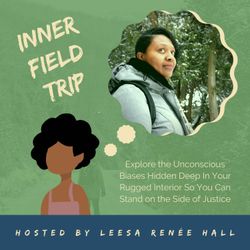
Inner Field Trip®
Explore the Unconscious Biases Hidden Deep in Your Rugged Interior So You Can Align with Justice
Latest episode
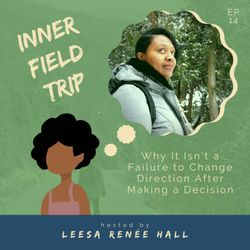
14. Why It Isn't a Failure to Change Direction After Making a Decision
37:05||Season 1, Ep. 14What does it mean to change direction after making a decision? Journey with Leesa as she shares why the format of the podcast is changing and what you can expect in future episodes.PLEASE NOTE: Leesa is not seeking solutions or fixes on what to do differently. She's gone through weeks and weeks of conversations with her podcast production team, Director of Ops, inner circle, and, of course, her reflective writing process, to arrive at this decision. She's stating her experience. She doesn't need to engage in a discourse or a discussion about this. It's just an opinion." She's made a decision on what works best for her, her brand, and her ancestorship.
More episodes
View all episodes
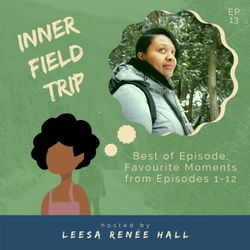
13. The Best Of Episode: Favorite Moments from Episodes 1-12
50:14||Season 1, Ep. 13In this Best Of episode, Leesa Renée Hall shares her favorite moments from Episodes 1-12 in non-chronological order. In Episodes 1-12, Leesa and her guests had deep conversations around topics like anger, land acknowledgments, raising anti oppressive children, the power of naming, coalition building, queasy stomachs that happen when you're exploring biases, grief, contempt, mental wellness, emotional tax, and honouring one's boundaries.Here are the episodes mentioned in the order they appeared in this episode:Episode 4 with Karlyn PercilEpisode 1 with Leesa Renée HallEpisode 5 with Andrea J. LeeEpisode 8 with Miriam Hall, Rachael Neu, Anakha Coman, and Oni Marchbanks (in the order they spoke) Episode 2 with Tiffany M. JewellEpisode 6 with Asha FrostEpisode 9 with Paul ZelizerEpisode 3 with Leesa Renée HallEpisode 7 with Kelly DielsEpisode 10 with Leesa Renée HallEpisode 11 with James-Olivia Chu HillmanEpisode 12 with Layla F. SaadClick on each episode for show notes, episode resources, and lightly edited transcripts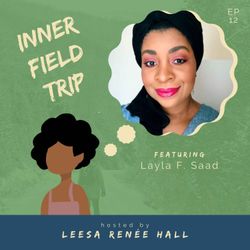
12. Why Anti-Racism Educators Have Strong Boundaries Around Their Time, Energy, and Abilities
01:07:04||Season 1, Ep. 12Ever wonder why most anti-racism educators and anti-bias facilitators seem to disappear? Layla F. Saad is a New York Times bestselling author of the ground-breaking book me and white supremacy (2020), the host of good ancestor podcast, and the founder of good ancestor academy. As a widely read writer, a globally sought speaker, and a popular podcast host, Layla is passionate about creating Inspiration, Education & Activation for personal and collective change in the world. Layla’s work is driven by a powerful desire to become a good ancestor; to live and work in ways that leave a legacy of healing and liberation, especially for Black girls and Black women.Layla is unapologetically confronting the oppressive systems of white supremacy and patriarchy, while offering important teachings and tools for transforming consciousness, cultivating personal anti-racism practice and taking responsibility for our individual and collective healing. Here's what you'll learn:The 2 authors Layla claims as her ideological ancestors and how their example helps Layla become a good ancestorHow Layla honours her faith while staying open to exploring other religious and spiritual practicesThe powerful way white people can do ancestral work without wallowing in pity, pain, or angerThe key difference between honouring your mentor vs deifying them (and how one informs whether you’re doing the inner work or not)Why knowing your internal boundaries are more important than verbally expressing them (and how this sets you up to be a good ancestor)How to honour your boundaries even in situations that call for you to be flexibleClick here for show notes, episode resources, and lightly edited transcripts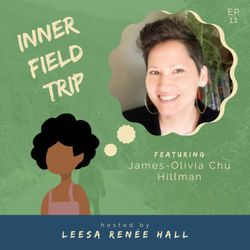
11. How to Be in Right Relationship With Anti-racism, Anti-bias, and Anti-oppressive Educators Without Wallowing in Self-contempt
54:56||Season 1, Ep. 11Why does the pupil have contempt for their anti-racism or anti-bias educator? James-Olivia explores that questions as she shares why some students who desire to be anti-racist, anti-bias, and anti-oppressive end up with deep resentment towards their educator. James-Olivia offers some tips on how to stay in right relationship and what is really going on when contempt builds.James-Olivia Chu Hillman facilitates and mediates uncomfortable, necessary, life-changing conversations with those who want more joy and connection and less suffering in their most important relationships—with themselves, their loved ones, their organizations, and the world.James-Olivia comes to the work of relational life & leadership coaching and facilitation with the lived experience of moving through life in the United States as a multi-racial and sometimes white-presenting “other” with multiple, intersecting privileged and marginalized identities. They bring relentless compassion, an unusual perspective, and an eclectic variety of tools to the conversation of expanding our lives and leadership beyond personal growth and into relational development. James-Olivia believes that our freedoms are bound to one another.Here’s what you’ll learn:How being of Chinese and German Jewish descent has shaped James-Olivia’s work in this worldThe influence of music and how it kept James-Olivia connected to community in a way religious services at her church could notThe parable of choirs and why it’s an apt metaphor as to why we need to take breaks while doing the inner workWhat the United States’ political process lacks and how this missing trait influences American cultureHow the way someone reacts is not a violation of your boundaries (James-Olivia provides a beautiful reframe on an example Leesa shared)The concept of contempt and why this shows up in relationships that were once positive, nurturing, and supportiveThe strange labels some put on Black, Indigenous, and Women of Color (BIWOC) who are anti-racism, anti-bias, and anti-oppressive educatorsWhy expecting validation, gold stars, or high fives for doing the inner work is the wrong expectation (and what this assumption truly reveals)What you can give birth to and leave for future generations if you are voluntarily or involuntarily childfree (and why having no biological children is not an excuse to become a better ancestor)This episode’s sponsored message features Sarah Turino, a wellness advocate, who has been a patron in the Inner Field Trip community on Patreon since 2018.Click here for show notes, episode resources, and lightly edited transcripts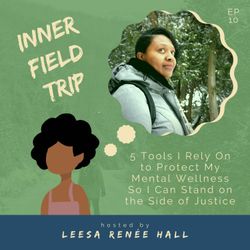
10. 5 Tools I Rely on to Protect My Mental Wellness So I Can Stand on the Side of Justice
58:15||Season 1, Ep. 10Is seeing a therapist the only way to protect your mental wellness? In this episode, anti-bias facilitator and mental wellness advocate, Leesa Renée Hall, shares the 5 tools she relies on to protect her mental wellness so she can stand on the side of justice. Although talk therapy is a powerful way to get well mentally and emotionally, there are other tools you can use that can either replace or complement talk therapy.Here’s what you’ll learn:The difference between overgiving and generosity and how knowing this can help you create stronger boundariesThe single fear stream-of-consciousness writing helped reveal to Leesa that finally helped her abandon the disease to pleaseWhy talk therapy, or meeting with a therapist, isn’t the only way to protect and preserve your mental wellness (Leesa shares her 5 mental wellness tools)Why journaling is more than keeping a diary (Leesa provides resources of evidence-based research on stream-of-consciousness writing)How Leesa learned to say no with ease without feeling guilty or overthinking (this is tool #2)Why meeting your ancestors, both the oppressed and the oppressors, is a key tool in being well emotionally and mentally (this is tool #3)How a Japanese cultural practice helps Leesa connect to the lands that are not indigenous to her bloodline (this is tool #4)The power of music and how listening to it or playing an instrument is a form of self-care (this is tool #5)This episode’s sponsored message features bestselling author, Rebekah Borucki, who is a patron in the Inner Field Trip community on Patreon.Click here for show notes and lightly edited episode transcripts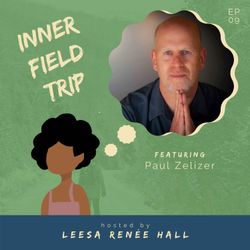
9. How to Leverage Coalition & Community to Create a Culture of Liberation
50:57||Season 1, Ep. 9Can you get free by yourself? That’s the question Paul Zelizer answers in this episode. He talks about why coalitions matter and how important they are when creating a liberatory framework. As a person with skin colour and gender privilege, yet a descendant of a historically oppressed group, Paul navigates this nuance within social justice communities both in his city and online.Paul Zelizer is one of the first business and marketing coaches to focus on the needs of conscious entrepreneurs and social impact businesses. He runs a global coaching practice supporting conscious entrepreneurs and growing their businesses to the next level while staying true to their deepest integrity. He also works with leaders to help them increase the transformational impact that they have in their organizations and in the world.Paul is the former Director of Social Media for Wisdom 2.0, the premier mindfulness brands in the world. In 2017. He founded Awarepreneurs because he saw the need for more honest conversations about combining the power of conscious business practices with the dynamics of social impact movements. In addition to conscious entrepreneurship, Paul is passionate about just about anything you can do in the Mountain High Country. He’s also passionate about power yoga, dark chocolate, sustainable living, and he’s a static about poetry, as well as deep centering breaths. He lives in Santa Fe, New Mexico.Here’s what you’ll learn:The clues Paul’s Eastern European ancestors taught him to look for to spot fascism and the emergence of authoritarian personalitiesHow Paul balances his skin colour and gender privilege with identifying with a group that’s frequently oppressedWhy conflict is a natural part of coalition building and the best way to handle it when it shows upWhat generating imperfect show notes taught Paul about being inclusive and how not getting it right is one way to reject the culture of white supremacyHow a co-founder divorce with an earlier iteration of Awarepreneurs prepared Paul to become a better ancestorThis episode’s sponsored message features Chezza Zoeller who is a patron in the Inner Field Trip community on Patreon.Click here for show notes and lightly edited episode transcripts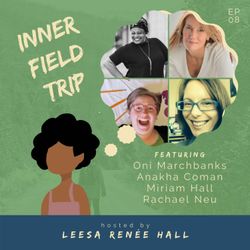
8. Navigating the Grief, Guilt, and Queasy Stomach After Unconscious Biases Become Conscious
01:03:51||Season 1, Ep. 8How can you navigate the swirls of physical and emotional issues while exploring unconscious biases? In this episode, Oni Marchbanks, Anakha Coman, Miriam Hall, Rachael Neu, all Inner Field Trip Mentor Coaches, talk about their ancestors, the re-emergence of the Black Lives Matter movement, the culture of white supremacy, the power of hope, and what doing the work really means.Here’s what you’ll learn:The process each of the four mentor coaches followed to move from patron to Leesa’s innercircleThe ideological and familial ancestors each shared and how they’ve come to terms with the ancestors who have caused harmWhat contemplative practices reveal about one’s unconscious biases – and how to navigate the discomfort of what follows (Miriam gives this tip)The event that caused Oni to seek help in managing racial trauma (and the advice she has for Black, Indigenous, and People of Colour who are trying to appear strong)Why it’s so hard for white people to release their submission to the culture of white supremacy (Anakha shares where it lives in the body)What stream-of-consciousness writing typically reveals and why you need to find the courage to move beyond that (Rachael shares her unique experience)Why there are six seasons – and not four – when doing the inner work of unpacking unconscious biases (Oni shares this tip)Click here for show notes and lightly edited episode transcripts